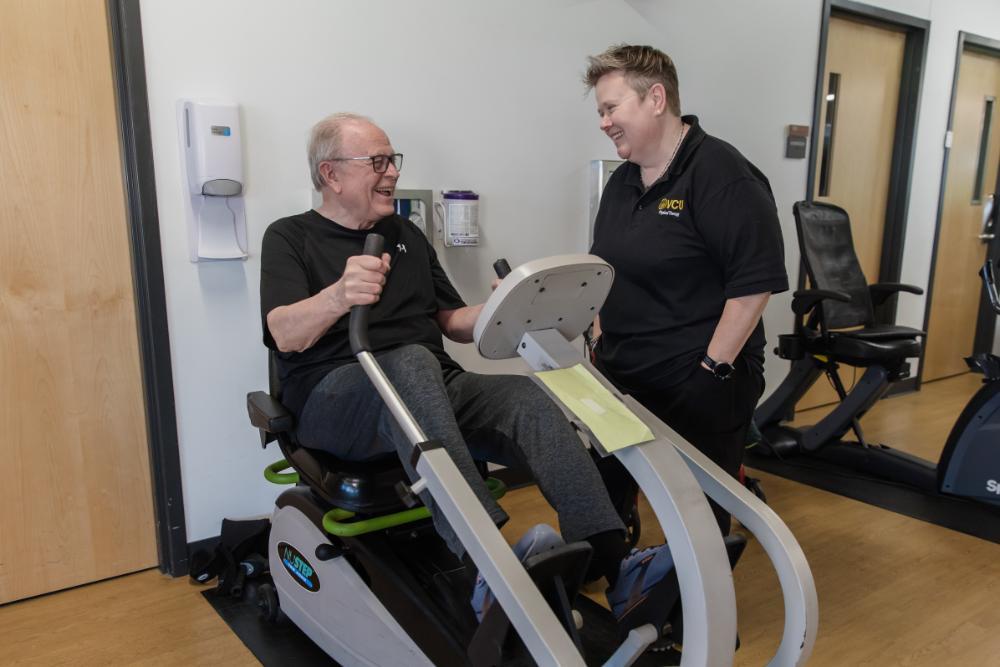
Physical Therapy
Individuals are referred to physical therapy at the VCU Parkinson’s and Movement Disorders Center for a comprehensive evaluation of your walking and balance. The role of a physical therapist is to evaluate, restore, maintain and promote optimal physical function and quality of life by preventing the progression of impairments, functional limitations and disabilities that result from a disease.
- To determine if your walking has changed: Disorders of walking (gait) and balance are common and significant causes of reduced quality of life and independence in individuals with movement disorders.1 Losses of balance and/or having a sense of unsteadiness are related to reduced walking speeds and decreased walking smoothness contributing to fall risk.
- To determine if your confidence has changed: Changes to walking are common risk factors for falls, and are not purely driven by disease. Development of a fear of falls, following either a fall or merely a loss of balance, can result in a person choosing to do less, which can also have a significant impact on independence. This can lead to disuse, further contributing to imbalance and more falls. If you are doing less, your balance will get worse! Unfortunately, most individuals are not evaluated by a physical therapist until loss of mobility becomes substantial or following an event such as a serious fall.
- To determine fall risk and potential for fall reduction: It is well established that fall risk reduction is a multifactorial process, involving reviewing medications, balance and gait assessment, musculoskeletal assessment, reduction of home hazards and cardiovascular assessment.
- To evaluate how you are walking now and measure changes over time: It becomes necessary to evaluate one’s gait and balance over the course of a disease in order to address these issues proactively. The Movement Disorders Society recommends a thorough evaluation of gait and balance as part of a defined standard of care. “Detailed assessment with ambulatory gait monitoring devices or in a sophisticated gait laboratory are justified prior to surgery, to help document or identify impairments, to identify subtle changes over time and therapeutic effects, and research. Increased attention has recently been given to the cognitive aspects of gait. These also should be assessed as part of the routine evaluation of gait disturbances. Fall risk assessment is an essential part of the evaluation of a patient with gait disturbance including internal and external risk factors.”
- To contribute to research: Identifying the natural changes to walking and balance associated with various movement disorders’ would allow clinicians to better understand the efficacy of interventions and ways to prolong levels of independence. We encourage you to register to be a part of our clinical database!
A board certified specialist in neurologic physical therapy will evaluate you. A neurologic physical therapist is a physical therapist who specializes in the evaluation and treatment of individuals with movement problems due to disease or injury of the nervous system. Visits are typically 90 minutes.
- Pretesting questionnaires regarding confidence, activities of daily living, lifestyle and quality of life.
- Clinical screening of your vital signs, visual system, range of motion, strength and sensation.
- A comprehensive evaluation of your walking and balance using standardized measures of gait and balance that help to determine fall risk.
- Computerized gait analysis to measure several characteristics of your walking, including speed, pace and steadiness. We will use this information to compare your walking to normal populations and to offer recommendations for improvement.
- Computerized analysis of your balance and postural sway under various sensory conditions and of your reactive postural control using a Computerized Dynamic Posturography system. We will use this information to compare your steadiness and postural control to normal populations and to offer recommendations for improvement.
- Recommendations for a comprehensive general wellness program including: stretching and mobility, aerobic training and strength training based upon current best evidence.
- Recommendations for fall prevention and risk reduction.
Following your appointment, the results and recommendations of your evaluation will be provided to you and anyone you would like to have included in your care. Should it be determined that you would benefit from ongoing physical therapy, we will send a referral from your physician, as well as a report of your evaluation to a local provider.
To prepare for your evaluation, we recommend you:
- Get a good night’s rest.
- Eat meals as you typically would.
- Take all of your prescription medications as prescribed, unless otherwise instructed.
- Dress comfortably in walking shoes.